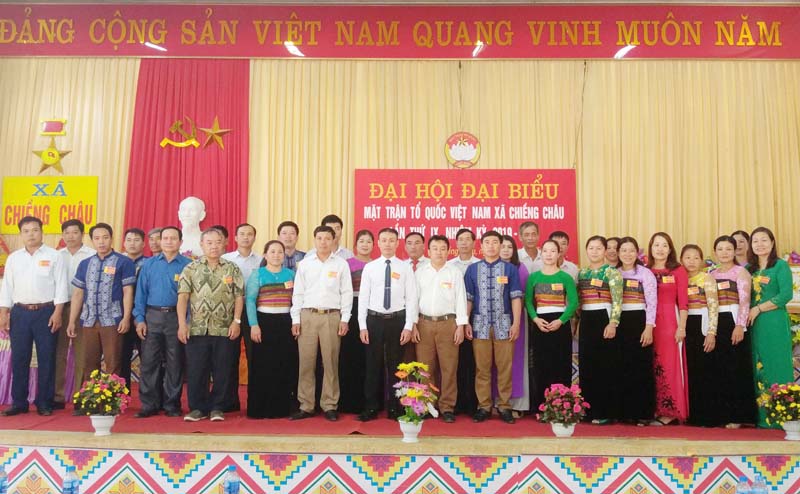
HBO – The Vietnam Fatherland Front (VFF) in Chieng Chau commune has successfully held the ninth congress for the 2019-2024 tenure. The unit was chosen by the VFF Committee in Mai Chau district to organize a model congress at the communal level.

The executive board of VFF Chieng Chau for the 2019-2024
tenure make debut.
During the 2013-2018
tenure, under the leadership of the communal Party Committee and with the guidance
of the VFF-Mai Chau chapter as well as the regular and effective coordination between
local authorities and member organisations, the front work and the great
national unity have been consolidated and developed incessantly.
The VFF Committee in Chieng
Chau has well disseminated and encouraged locals to engage in economic
development as well as movements and campaigns, especially the "All people
unite to build new-style rural areas and civilized urban areas” movement. In
the tenure, the organization built a "For the poor” fund, with 115 million VND
(4,940 USD) raised, which was used to build 10 charitable houses and present
over 700 gifts to poor households. Thirty-six groups of families were set up in
all residential areas to self-govern security and order in their areas, and over
80 percent of families and residential areas were recognised as cultural ones
each year.
At the congress, delegates
reviewed achievements and shortcomings in the 2013-2018 tenure and set forth an
action programme for the new tenure, which focuses on renewing the content and
method of operation of the communal VFF Committee and the Front Work Boards in
residential areas.
Attention will be also
paid to intensifying coordination between member organisations in stepping up
and increasing the quality of patriotic emulation movements and campaigns,
improving the efficiency of social criticism and supervsion activities, thus
contributing to well implementing social welfare policies, consolidating the
great national unity and boosting local socio-economic development.
The congress chose 33
delegates to participate in the executive board of the VFF Chieng Chau for
2019-2024. The VFF – Mai Chau chapter granted certificates of merit to two
collectives and three individuals for their outstanding contributions to the
front work in the 2013-2018 tenure./.
More than just an information technology teacher, Bui Van Nien is an inspiring figure who has nurtured the scientific curiosity and creative spirit of students in Vietnam’s ethnic minority communities.
Da Bac is the most disadvantaged mountainous district in Hoa Binh province, with ethnic minorities accounting for about 90% of its population. Over the past years, the district has mobilised resources to implement ethnic policies to improve the quality of life of local people.
In recent years, Hoa Binh province has consistently prioritised the protection, care, and education of children, particularly those from ethnic minorities and disadvantaged backgrounds, by creating a safe, healthy, and nurturing environment for their all-round development.
The Steering Committee for Tobacco Harm Prevention and Control of Hoa Binh province, in coordination with the Tobacco Harm Prevention and Control Fund, held a ceremony on May 28 in response to the World No Tobacco Day (May 31) and the National No Tobacco Week (from May 25 to 31). The event was chaired by Nguyen Van Toan, Standing Vice Chairman of the provincial People’s Committee and head of the Steering Committee.
Since 2021, the Center for Industrial Promotion and Industrial Development Consulting (CIIDC) under the Department of Industry and Trade has been implementing a school lighting model as part of the plan for using energy efficiently and economically in Hoa Binh Province in the pẻiod of 2021 - 2025. This model not only aims to improve the learning conditions and enhance the education quality, but it also promotes the message of energy saving, energy security, environmental protection and contributes to the goals of socio-economic development.
In the 2024 - 2025 school year, the entire Hoa Binh provincial education sector includes 520 educational institutions and schools. Among them are 13 ethnic boarding schools with 153 classes and 4,487 students. Four of these schools have met national standards, reaching 30.7 percent.



